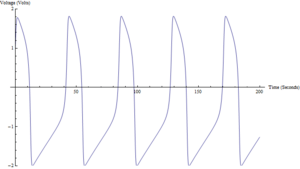Time domain facts for kids
The time domain is a way to look at how things change over time. Imagine you're watching a movie. The movie shows events happening one after another, and you see how they change from moment to moment. That's a bit like the time domain!
In science and engineering, when we talk about the time domain, we are looking at how a signal, a measurement, or a mathematical graph changes as time passes. This helps us understand how things behave and develop.
Contents
What is a Signal?
A signal is like a message that carries information. For example, the sound waves from your voice are a signal. The electricity flowing through a wire is also a signal. When we study these signals in the time domain, we are watching their ups and downs, or how strong they are, at different points in time.
Continuous Time vs. Discrete Time
When we look at signals in the time domain, there are two main ways time can be measured:
Continuous Time
Think of a smooth, flowing river. The water is always moving, without any breaks. This is like continuous time. In continuous time, a signal can change at any tiny moment. There are no gaps in the time measurement.
- Analogue Signals: Many natural signals are continuous. For example, the sound of a guitar string vibrating creates an analogue signal. It changes smoothly over time. Old-fashioned record players also use analogue signals.
Discrete Time
Now, imagine taking a photo every second. You have a series of pictures, not a continuous video. This is like discrete time. In discrete time, we only look at the signal at specific, separate moments. There are gaps between these moments.
- Digital Signals: Most modern technology uses digital signals. When you listen to music on your phone or watch a video online, it's all digital. Digital signals are made by taking many quick "snapshots" of a continuous signal. This turns it into a series of numbers that computers can easily understand and process.
Why is the Time Domain Important?
Understanding the time domain helps scientists and engineers in many ways:
- Designing Electronics: It helps them see how electronic circuits respond to different inputs over time.
- Studying Sound: It shows how sound waves change, which is important for making good microphones or speakers.
- Analyzing Data: It allows us to see patterns and changes in data, like how a temperature changes throughout the day.
By looking at signals in the time domain, we can understand their behavior, predict what they might do next, and even fix problems.
Images for kids
See also
 In Spanish: Dominio del tiempo para niños
In Spanish: Dominio del tiempo para niños
 | Janet Taylor Pickett |
 | Synthia Saint James |
 | Howardena Pindell |
 | Faith Ringgold |



